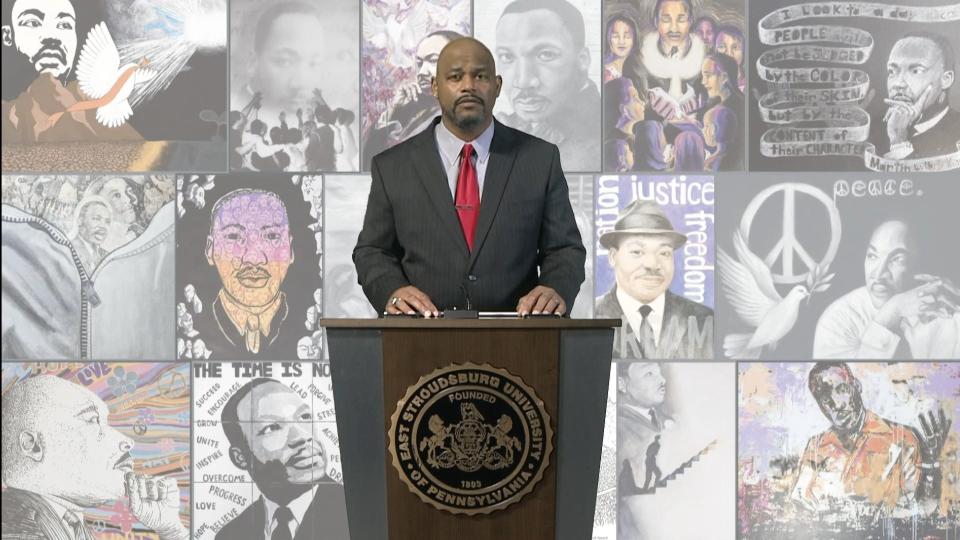Lessons from Dr. King: ESU event highlights 'common humanity', awards scholarships
It began, as so much does, with a Facebook post.
Harrison Bailey III was “scrolling through the ever-present nonsense” when he saw the post that became a building block for his speech at East Stroudsburg University’s annual celebration of Martin Luther King Jr. Bailey is the principal of Liberty High School in Bethlehem and earned a doctoral degree in educational leadership from ESU last year.
The post was from a police officer who had made a traffic stop for texting and driving and, on approaching the car, found a “young Black man who was looking at me like he was absolutely terrified with his hands up.”
The officer tried to reassure the driver that the stop was about ensuring his safety on the road, Bailey said. The post went on to call for a solution to this kind of tension and fear, from anyone who might be able to provide one: “It doesn’t matter to me who’s to blame. I just wish someone would fix it.”
The story raised a lot of questions for Bailey, including “most importantly, why won’t we fix it?”
He wondered what King would make of the encounter: “Would he be proud of the things that have progressed, or disappointed in the remaining vestiges of inequity?”

Although it’s an interesting question,” Bailey continued, “it isn’t one that we can sufficiently answer. What we can more accurately assume is that he would call on every one of us to continue fighting for the rights of all disadvantaged and oppressed people.”
He went on to share five lessons from King that would help listeners answer that call.
One: Recognize our common humanity
“Every human being is connected biologically, socially and spiritually,” Bailey said.
It’s more difficult to deny rights to people whose humanity we see, he said.
“Recognizing another person’s humanity is important when we agree with their behavior, but it’s absolutely critical under the conditions of opposition.”
Two: Know your why
Having a purpose is motivating in difficult times, Bailey said.
“In addition, your why must be bigger than you. The measure of true success comes in the investment we make in others,” Bailey said.
Three: Learn to love
In particular, Bailey promoted the Greek “agape” love, not a romantic love but “patience, kindness, humility, respectfulness, forgiveness, honesty and commitment.”
Love is not just about feeling, but about acting, Bailey said.
“In the midst of physical and verbal assault, Dr. King preached peaceful protest and love. He recognized that this persistent expression, in a public forum, could only be met with violence for so long. He believed that the public eye would clearly see hate being expressed against the peaceful. The tide would change, and ultimately, love would win. In so many ways, he was right.”
Four: Protect your hope at all costs
Some form of faith — “in yourself, in the people around you or in you higher power” — is needed during adversity.
Hope “defines how we see failure,” Bailey said, whether a lack of hope leads to giving up or abundant hope keeps someone striving for success.
“People who accomplish incredible things are often ordinary people with uncommon levels of hope. They see possibility where others see futility. They see a chance where others see despair.”
Five: Dare to lead
Leadership is closely tied to character, Bailey said. In fact, it’s “character in action” and the ability to do the right thing despite what it may cost.
“Dr. King saw leadership as an act of service and sacrifice,” Bailey said.
Serving and sacrificing builds influence, he said, “and when we build genuine influence with people, then we have earned the right to be called a leader.”
Scholarships and awards
The event also recognized this year’s Mary Gertrude Smith Boddie Scholarship recipients, Martin Luther King Jr. Award recipients and winners of the Julianna V. Bolt Art Contest.
Receiving $3,460 each for the spring 2022 semester are: Carley Adams, a sophomore psychology major from North Wales; Taylor Brielle Black, an undeclared sophomore from Abington; Keichelle Lewis, a senior exercise science major from Philadelphia; and Tammy McNeil, a senior psychology major from Easton.
Martin Luther King Jr. Awards are given annually to students, staff and community members who “exemplify characteristics of Dr. King’s philosophy of non-violence, equality, justice, cultural diversity and respect for humanity,” according to ESU. This year’s recipients are: Faith Dorsey, a senior from Easton majoring in English with a secondary education concentration; Jessica Santiago, an assistant professor and director of the Warrior Success Advising and Retention programs; and Marilyn Brown, community outreach coordinator at the First Baptist Church of East Stroudsburg and educator in New York City.
The art contest winners are: first place, Emma Strauch of Stroudsburg High School; second place, Emma Zauck of Stroudsburg High School; third place, Sampson Metzgar of Stroudsburg High School. Honorable mentions were Orion Flelix of Pocono Mountain West High School and Abigale Bunje of Pocono Mountain East High School.
Kathryne Rubright is a reporter covering the environment, northeast Pa. politics, and local news. She is based at the Pocono Record. Reach her at krubright@gannett.com.
This article originally appeared on Pocono Record: ESU awards scholarships, reflects on King's legacy at event

